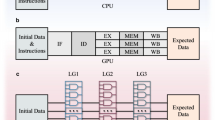Abstract
This paper presents FPGA acceleration and implementation results of a hardware module for generating orbital function. The authors have implemented some of the computationally demanding part of the GPP quantum chemistry source code in FPGA. The orbital function core is composed of the authors’ customized floating-point hardware modules. These modules are scalable from single to double precision, capable of working at frequency ranging from 100 to 200 MHz. Besides hardware implementation, the design process also involved reformulation of the algorithm in order to adapt them to the platform profile. The computational procedure presented in this paper is part of an algorithm for generating exchange-correlation potential, and is also recognized as one of the most computationally intensive routines. This feature justifies the effort devoted to develop its hardware implementation.
Access this chapter
Tax calculation will be finalised at checkout
Purchases are for personal use only
Preview
Unable to display preview. Download preview PDF.
Similar content being viewed by others
References
Silicon Graphics, Inc. Reconfigurable Application-Specific Computing User’s Guide, Ver. 005. SGI (January 2007)
Mazur, G., Makowski, M.: Development and Optimization of Computational Chemistry Algorithms. In: KDM 2008, Zakopane, Poland (March 2008)
Omondi, A.R.: Computer Arithmetic Systems. Prentice Hall, Cambridge (1994)
Underwood, K.D., Hemmert, K.S., Ulmer, C.: Architectures and APIs: assessing requirements for delivering FPGA performance to applications. In: ACM/IEEE Conference on Supercomputing, Tampa, Florida, November 11-17 (2006)
Gothandaraman, A., Peterson, G., Warren, G., Hinde, R., Harrison, R.: FPGA acceleration of a quantum Monte Carlo application. Parallel Computing 34(4-5), 278–291 (2008)
Gothandaraman, A., Warren, G.L., Peterson, G.D., Harrison, R.J.: Reconfigurable accelerator for quantum Monte Carlo simulations in N-body systems. In: Proceedings of the 2006 ACM/IEEE Conference on Supercomputing, SC 2006, Tampa, Florida, p. 177. ACM, New York (2006)
Wielgosz, M., Jamro, E., Wiatr, K.: Accelerating calculations on the RASC platform. A case study of the exponential function. In: Becker, J., et al. (eds.) ARC 2009. LNCS, vol. 5453, pp. 306–311. Springer, Heidelberg (2009)
Ramdas, T., Egan, G., Abramson, D., Baldridge, K.: Towards a special-purpose computer for Hartree-Fock computations What’s on the table, and how do we take it? Theoretica Chimica Acta 120(1-3), 138 (2008)
Author information
Authors and Affiliations
Editor information
Editors and Affiliations
Rights and permissions
Copyright information
© 2010 Springer-Verlag Berlin Heidelberg
About this paper
Cite this paper
Wielgosz, M., Jamro, E., Russek, P., Wiatr, K. (2010). Hardware Implementation of the Orbital Function for Quantum Chemistry Calculations. In: Sirisuk, P., Morgan, F., El-Ghazawi, T., Amano, H. (eds) Reconfigurable Computing: Architectures, Tools and Applications. ARC 2010. Lecture Notes in Computer Science, vol 5992. Springer, Berlin, Heidelberg. https://doi.org/10.1007/978-3-642-12133-3_31
Download citation
DOI: https://doi.org/10.1007/978-3-642-12133-3_31
Publisher Name: Springer, Berlin, Heidelberg
Print ISBN: 978-3-642-12132-6
Online ISBN: 978-3-642-12133-3
eBook Packages: Computer ScienceComputer Science (R0)




